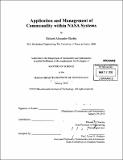| dc.contributor.advisor | Edward F. Crawley. | en_US |
| dc.contributor.author | Rhodes, Richard Alexander | en_US |
| dc.contributor.other | Massachusetts Institute of Technology. Dept. of Aeronautics and Astronautics. | en_US |
| dc.date.accessioned | 2010-09-01T16:27:00Z | |
| dc.date.available | 2010-09-01T16:27:00Z | |
| dc.date.copyright | 2010 | en_US |
| dc.date.issued | 2010 | en_US |
| dc.identifier.uri | http://hdl.handle.net/1721.1/58081 | |
| dc.description | Thesis (S.M.)--Massachusetts Institute of Technology, Dept. of Aeronautics and Astronautics, 2010. | en_US |
| dc.description | Cataloged from PDF version of thesis. | en_US |
| dc.description | Includes bibliographical references (p. 177-180). | en_US |
| dc.description.abstract | Commonality can be defined as the sharing of assets such as components, designs, processes, technologies, interfaces, and/or infrastructure across systems. Through commonality, NASA has the opportunity to develop, produce, and operate systems more efficiently, thus reducing their life cycle costs. However, the benefits gained from commonality greatly depend on how commonality is managed, i.e. how successfully the identification of opportunities is managed and how those opportunities are subsequently evaluated and implemented. The goal of this research is to observe how commonality is managed within NASA systems and to identify the best practices and key challenges for the management of commonality. To that end, three case studies were conducted of past and present NASA systems: the Constellation Space Suit System (CSSS), the International Standard Payload Rack (ISPR), and the Core Flight-Software System (CFS). Each of the case studies was chosen because it offered a diverse view into the management of commonality, by differing in the program in which the system was developed, the type of system that was developed, and the method used to develop the system. The case studies offer a detailed look into current management practices within NASA and allow for comparisons to be made with seven industry case studies, previously conducted by Boas (2008). | en_US |
| dc.description.abstract | (cont.) The three NASA case studies showed that two trends that were consistently observed in the industry cases (life cycle offsets and divergence) also exist within NASA systems. In addition, the management approaches were observed to be common between NASA and industry. In conducting the NASA case studies, several management methods were identified that can encourage the successful application of commonality, including: the organizational structure, the level of management support, the type of contract, and design competencies. Each of the observed management methods are discussed in the thesis within the scope of the individual case study and in the broader scope of all three systems in the cross-case analysis. In each of the three NASA case studies and seven industry case studies, it was observed that the evaluation of commonality was often either overlooked or reduced to notional or qualitative analysis. To address this problem, both a deterministic economic cost model and an economic cost model that evaluates commonality as a Real Option were developed to better evaluate the systems. Evaluating commonality as a Real Option allows management to consider uncertainties and flexibility in the system. Both methods of evaluating opportunities for commonality are applied using information from the CSSS case study as an example. | en_US |
| dc.description.statementofresponsibility | by Richard Alexander Rhodes. | en_US |
| dc.format.extent | 185 p. | en_US |
| dc.language.iso | eng | en_US |
| dc.publisher | Massachusetts Institute of Technology | en_US |
| dc.rights | M.I.T. theses are protected by
copyright. They may be viewed from this source for any purpose, but
reproduction or distribution in any format is prohibited without written
permission. See provided URL for inquiries about permission. | en_US |
| dc.rights.uri | http://dspace.mit.edu/handle/1721.1/7582 | en_US |
| dc.subject | Aeronautics and Astronautics. | en_US |
| dc.title | Application and management of commonality within NASA systems | en_US |
| dc.type | Thesis | en_US |
| dc.description.degree | S.M. | en_US |
| dc.contributor.department | Massachusetts Institute of Technology. Department of Aeronautics and Astronautics | |
| dc.identifier.oclc | 639280451 | en_US |
